
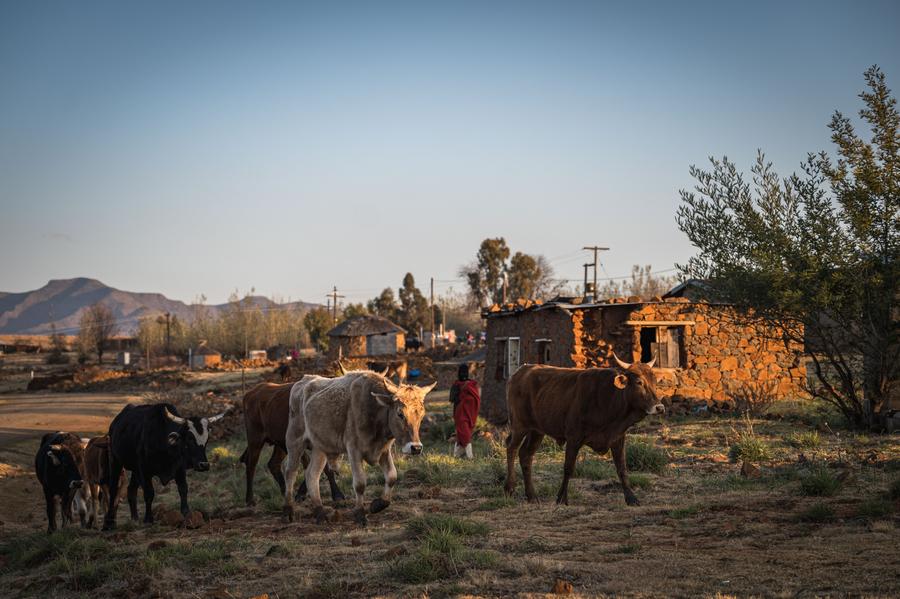 This photo taken on July 31, 2025, shows a view on the outskirts of Maseru, Lesotho. (Xinhua/Wang Guansen)
This photo taken on July 31, 2025, shows a view on the outskirts of Maseru, Lesotho. (Xinhua/Wang Guansen)As winter grips Lesotho, a landlocked country in southern Africa, groups of textile workers roam the industrial zone in the national capital of Maseru, knocking on factory doors in search of jobs.
Many have been laid off and are now struggling to find new employment amid uncertainty.
The unemployment stems from a sweeping U.S. tariff policy announced in April. U.S. President Donald Trump declared a series of so-called "reciprocal tariffs" on all trade partners, citing trade imbalances.
For Lesotho, one of the world's least developed countries, the policy has dealt a severe blow to its already fragile economy, particularly the export-oriented textile industry.
The United States is Lesotho's second-largest trading partner. In 2024, bilateral trade reached 240 million U.S. dollars, with Lesotho exporting goods worth 237 million dollars to the United States, accounting for about 10 per cent of its gross domestic product (GDP). A large portion of the country's textile products is destined for the U.S. market.
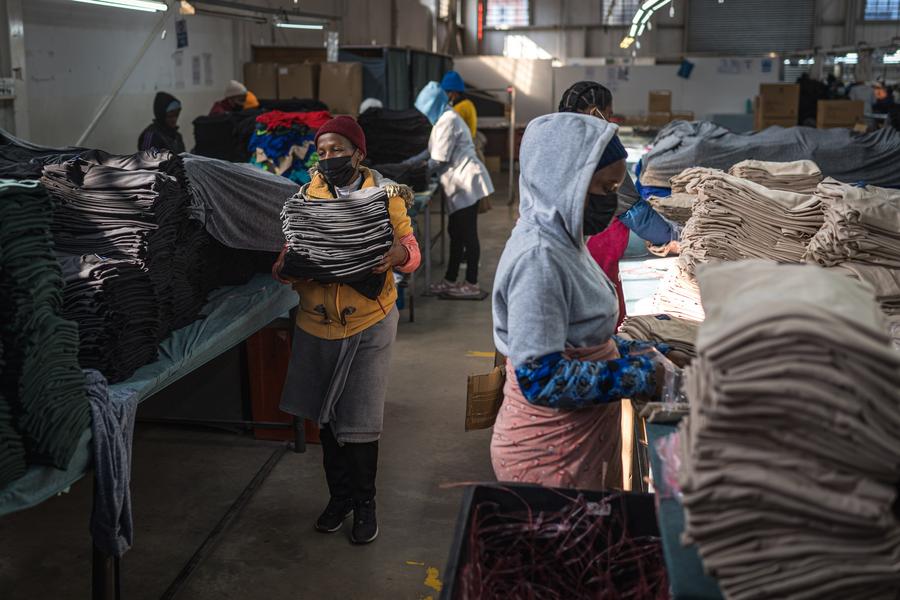 Workers arrange clothes at a textile factory in Maseru, Lesotho, July 30, 2025. (Xinhua/Wang Guansen)
Workers arrange clothes at a textile factory in Maseru, Lesotho, July 30, 2025. (Xinhua/Wang Guansen)"It's unbelievable and unfair," Mokhethi Shelile, Lesotho's minister of trade, industry, business development and tourism, said in an interview with Xinhua in late July, before Washington lowered its tariff rate on Lesotho exports to 15 percent. "This also violates World Trade Organization principles."
Shelile said the textile industry is Lesotho's largest private employer, providing 36,000 jobs, most of which are held by women.
"After the new tariff policy, American exporters have already canceled 80 percent of the orders, resulting in about 13,000 job losses," he added.
In July, Lesotho declared a two-year state of disaster due to a sudden surge in unemployment.
"We have a very high unemployment rate, especially among youth. If they never work when they are young, they will have no pension when they grow old, and it's like a life sentence for them," Shelile said.
Lesotho has a population of just over 2 million. Nearly half live below the poverty line, with an unemployment rate of about 25 percent, leaving the country with limited capacity to respond to the U.S. tariff increase.
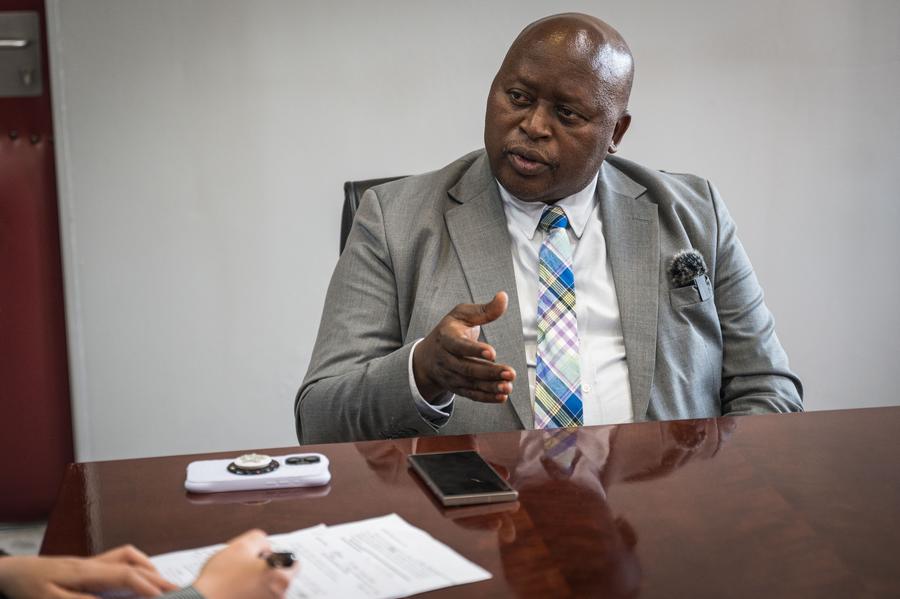 Mokhethi Shelile, Lesotho's minister of trade, industry, business development and tourism, speaks during an interview with Xinhua in Maseru, Lesotho, July 29, 2025. (Xinhua/Wang Guansen)
Mokhethi Shelile, Lesotho's minister of trade, industry, business development and tourism, speaks during an interview with Xinhua in Maseru, Lesotho, July 29, 2025. (Xinhua/Wang Guansen)Afri-Expo Textiles, a major local textile company founded in 2016, was severely impacted. While only 10 percent of its shipments had been bound for the United States, the repercussions were nonetheless substantial.
"We had to lay off nearly 500 workers to survive," said Teboho Kobeli, managing director of Afri-Expo Textiles.
In 2021, the company planned to expand to 10 industrial zones in Maseru, employing over 10,000 people.
"Four years later, that dream didn't come true," Kobeli said.
Afri-Expo Textiles currently runs one denim factory and two knitwear factories. Before the tariff hike was announced, Kobeli had secured a major U.S. order with enough projected profits to fund two new factories.
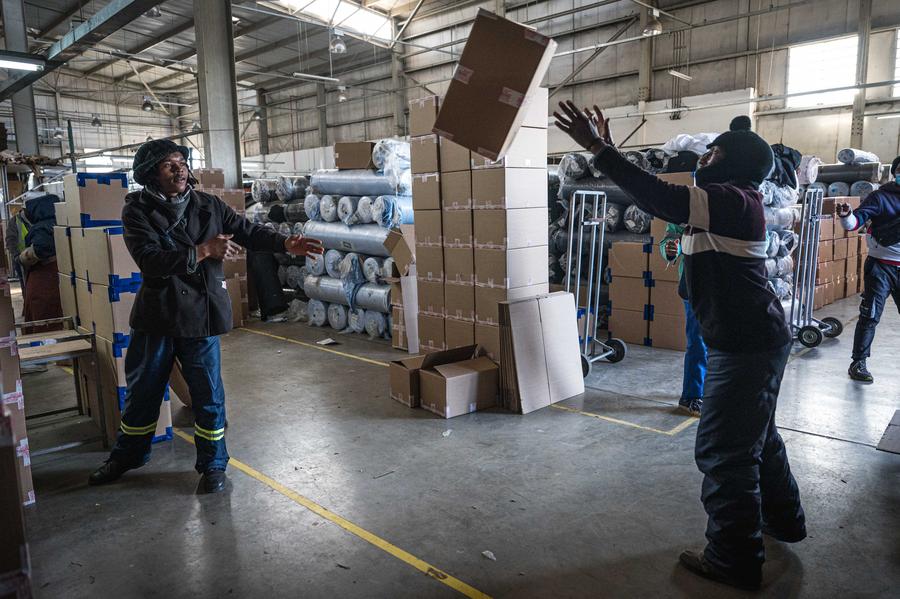 Workers transfer a box of clothes at the Afri-Expo Textile Factory in Maseru, the capital of Lesotho, July 29, 2025. (Xinhua/Wang Guansen)
Workers transfer a box of clothes at the Afri-Expo Textile Factory in Maseru, the capital of Lesotho, July 29, 2025. (Xinhua/Wang Guansen)"But now, it's all gone," he said.
Back in March, Trump referred to Lesotho as a country that "nobody has ever heard of" in a congressional address -- remarks that drew laughter from Republican lawmakers. Less than a month later, the 50 percent tariff was imposed. Now, production lines in Maseru sit idle, machines untouched as the industry struggles.
"I don't know where these jeans are going, or why the U.S. president is doing this to us," said Mahlape Makhele, a 31-year-old single mother who earns a living making denim. "All I can do is keep pressing the pedal of my sewing machine."
Mampho Moletsane, 50, has worked in the textile sector for 17 years and is now a back site supervisor. "I'm getting old, but what about the young workers?" she said.
Despite the challenges, Kobeli, the managing director, is not giving up.
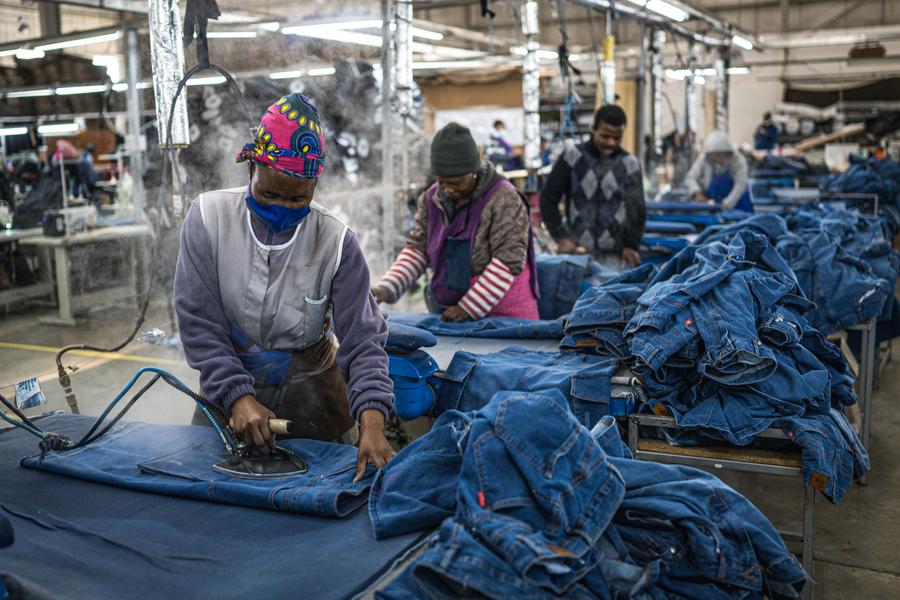 Workers iron jeans at the Afri-Expo Textile Factory in Maseru, the capital of Lesotho, July 29, 2025. (Xinhua/Wang Guansen)
Workers iron jeans at the Afri-Expo Textile Factory in Maseru, the capital of Lesotho, July 29, 2025. (Xinhua/Wang Guansen)He is seeking financing to import advanced machinery to improve efficiency and expand into new markets in southern Africa, while also exploring opportunities in Europe.
"I'm still positive about the future," Kobeli said.
The U.S. tariffs' impact goes well beyond lost jobs and a battered textile industry.
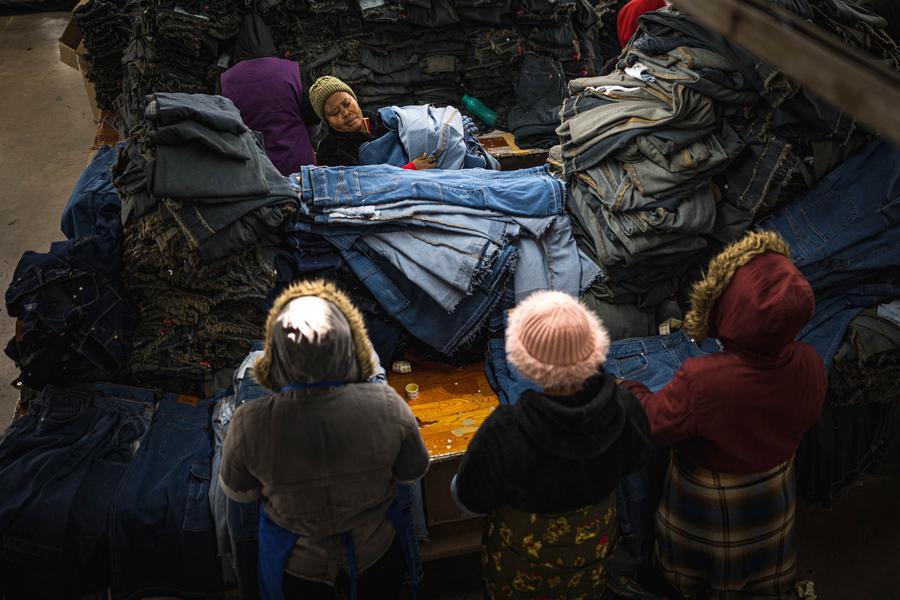 Workers arrange jeans at the Afri-Expo Textile Factory in Maseru, the capital of Lesotho, July 29, 2025. (Xinhua/Wang Guansen)
Workers arrange jeans at the Afri-Expo Textile Factory in Maseru, the capital of Lesotho, July 29, 2025. (Xinhua/Wang Guansen)It has seriously hindered Lesotho's industrialization and led to a foreign exchange shortage, said Shelile, the trade minister.
In response, Lesotho is deepening cooperation with other Global South countries to broaden export markets, support small and medium-sized enterprises, and stabilize its economy through multiple channels.
"We achieved economic growth in 2024," said Shelile. "And we are still working toward 2025."


















